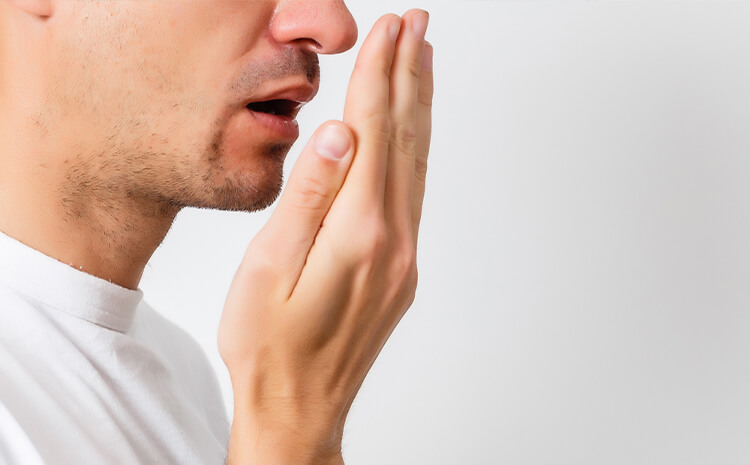
Bad breath is a common complaint in terms of oral health, and it may be due to reasons such as dental health, eating habits, smoking, or it is a complaint that should not be ignored because it may be an indicator of other underlying medical conditions.
Causes of Bad Breath
Nutrition
Some foods and beverages cause dry mouth. Tea, coffee and alcohol are some of them. Saliva plays a key role in removing bacteria from the mouth. When the mouth is dry, saliva production slows down, which leads to the growth of bacteria causing bad breath. Foods with high protein content, acidic foods and foods with high sugar content can also cause these bacteria to multiply. Frequent consumption of foods such as garlic, which has a sharp smell, can also cause bad breath.
Oral Hygiene
Bad breath is usually caused by the accumulation of bacteria in the mouth, and this is usually the result of inadequate oral hygiene. Actually, this does not mean that oral health is completely neglected. Factors such as neglecting the tooth brushing or not brushing teeth correctly, and not treating decayed teeth may be sufficient for bacteria to multiply.
It is important to brush the teeth twice a day to maintain oral hygiene. It is recommended that this be done for at least two minutes at a time, with a high-quality toothbrush (preferably electric) and high fluoride toothpaste. In addition to the brushing, dental floss or an interdental brush (interface brush) should also be used for cleaning between the teeth. Brushing teeth with the right technique is also very important. You can consult your dentist about the right tooth brushing techniques.
Since the bad smell can be caused by bacteria in the tongue, it is necessary to pay attention to tongue cleaning as well as tooth cleaning. You can clean your tongue with a toothbrush or with tongue cleaning products recommended by your dentist.
The best natural defense against bad breath is to increase the level of saliva. A sufficient amount of water should be consumed during the day. You should consult your dentist about adding food slices/peels such as lemon and orange to the water you drink. Because these foods contain citric acid, they can damage your tooth enamel if consumed excessively. Chewing gum can also be preferred as a method to increase saliva level, provided that it is sugar-free.
Dentists can prescribe some products that they think play a complementary role in oral hygiene, if they deem necessary, related to mouthwashes, also known as oral rinse.
Smoking
Smoking causes dry mouth, thereby reducing the amount of saliva and increasing the bacteria. The chemicals inside it are also factors for the bad breath. Smoking can also cause hairy tongue disease, which causes bad breath. Even worse, the smoker is often unaware of their bad breath, as excessive smoking causes a person’s sense of taste to decrease too.
Other Medical Conditions
If the problem of bad breath persists in the individuals who have completed their dental and gingival treatments and who perform regular and correct oral and dental care, other health problems should be started to be evaluated.
Strict weight loss strict diet programs can cause a strong-smelling compound known as “ketone”. Antihistamines, antidepressants, diuretic medications, decongestants, birth control pills and even certain vitamin supplements can change the way your body deals with certain bacteria, which can lead to an increased risk of gingival diseases accompanying bad breath. Tonsillitis and throat infections can also cause bad breath.
Whether there are other underlying medical conditions related to bad breath that does not heal should be evaluated together by your dentist and specialist doctors in other branches that your dentist will refer to.


